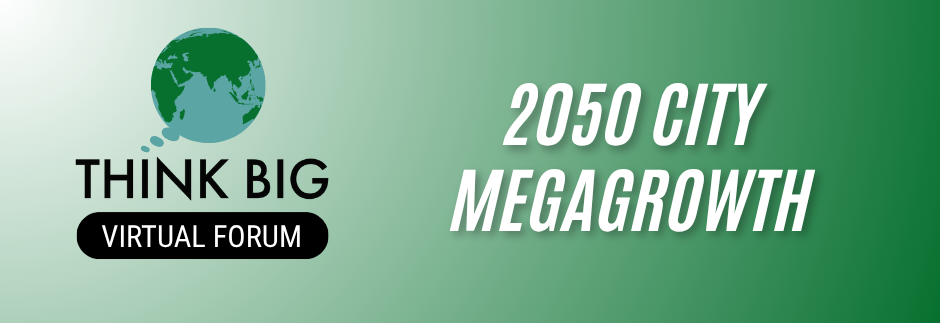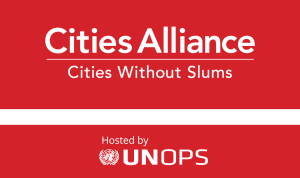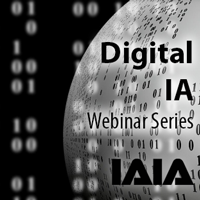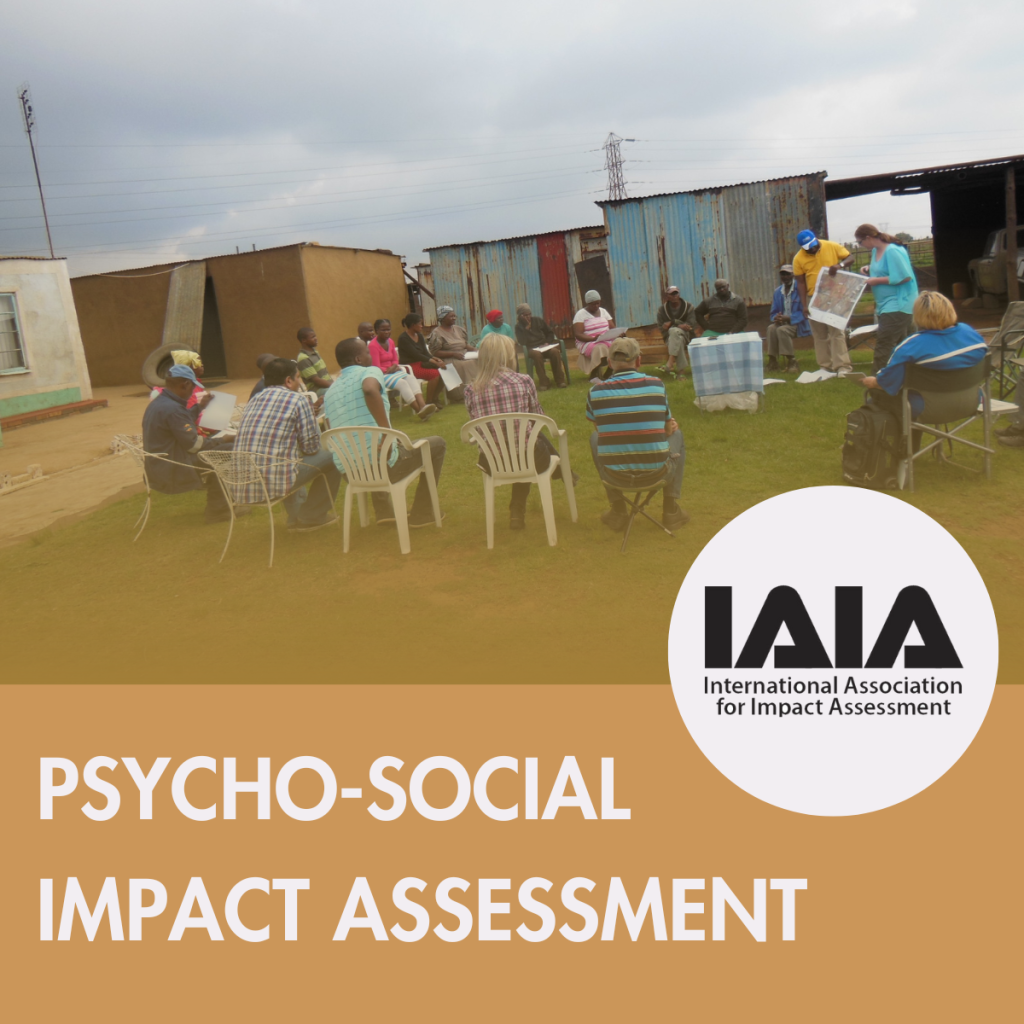
2050 CITY MEGAGROWTH — ASSESSING AND ADDRESSING THE IMPACTS (PART I)
A multi-part virtual forum exploring how impact assessment can guide megacity growth toward planetary sustainability
What are the potential impacts of megacity urbanization to 2050 and beyond on climate as well as other planetary boundary issues? How can IA processes help select among alternatives to address these impacts? In particular, what role should Strategic Environmental and Social Impact Assessment and long-term Cumulative Effects Assessment (CEA) play in informing planning and policymaking to address these issues?
Think Big Virtual Forum: 2050 City Megagrowth reviews the potential impacts of megacity urbanization to 2050 and beyond on climate as well as other planetary boundary issues. It also examines potential preferred alternatives for mitigating these impacts through IA processes, particularly Strategic Environmental and Social Impact Assessment and long-term Cumulative Effects Assessment (CEA).
Each session discusses topics/issues of interest to general audiences, IA practitioners, urban and regional planners, and policymakers.
For Part 1 of this series (see below), two pre-recorded panel presentations were released in March 2023, followed by a live panel discussion for Q&A with attendees and panelists. For Part II, two pre-recorded panel presentations were released in July 2023, also followed by a live panel discussion with Q&A.
Panel 1: Addressing 2050 Megagrowth through Strategic Environmental and Social Assessment
This session explores how strategic environmental and social assessments (SESAs) can help cities respond to global megagrowth and climate challenges. Peter Nelson outlines how SEA principles can guide global planning for a cleaner, more equitable future and highlights urban planning issues through examples from Sierra Leone. Weston A. Fisher examines long-term cumulative impacts of urban growth, proposing mitigation strategies and emphasizing the need for sustainability-focused city development strategies informed by E/SIA and cumulative effects analysis. Moderated by Heather M. H. Goldstone of Woodwell Climate Change Research Center.
Panel 2: 2050 Megagrowth, Informal Settlements, and the Value of SEAs to Address Urban Impacts
This session examines how strategic environmental and social assessments (SESAs) can help cities manage rapid urbanization, informal settlements, and climate resilience. Julian Baskin highlights the need for partnerships and innovative infrastructure delivery to support the urban poor in African cities. Yaw Amoyaw-Osei explores the widespread informal annexation of road and railway land and emphasizes enforcing environmental regulations in urban planning. Bryony Walmsley discusses the gaps between environmental and social safeguards on paper and their weak implementation in urban, climate-stressed contexts. Moderated by Heather M. H. Goldstone of Woodwell Climate Change Research Center.
Panel 3: Think Big Live Forum
This 90-minute live panel discussion featured real-time Q&A with attendees and panelists from the first two panels, plus commentary by Ahmed Sanda (Ashawa Consultancy Ltd. Nigeria) and Garry Middle (VisionEnvironment).
Meet the Experts
Panel 1: Peter Nelson and Weston A Fisher
Peter Nelson is Project Lead for Planning Green Futures.Org. He has over 40 years of experience in impact assessment and planning, including applying Strategic Environmental Assessments (SEAs) in Water, Minerals, Planning, Forestry, Natural Resource Conservation in Malawi, Ethiopia, Kenya, Ghana, Sierra Leone, Tanzania, Montenegro and Sierra Leone. He also has years of experience in regional planning, design and assessment in Scotland. He holds a Diploma in Town and Regional Planning from the University of Leeds (1976), the University of Salford, MSc, Environmental Conservation (1969), and the University of Cambridge, BA Physical Geography (1968).
Weston A. Fisher has over 30 years’ experience as an IA practitioner and capacity development professional in less-developed countries, including time living in Uganda, Kenya, Somalia, Botswana and Lesotho. He has been a trainer/facilitator in EIA in 21 countries. He joined the International Association for Impact Assessment (IAIA) in 2002. He was a key organizer of two IAIA Climate Change symposia at the World Bank and Aalborg, Denmark in 2010. He received IAIA’s Outstanding Service Award in 2014 and 2022 and has served as Co-chair of the IAIA’s Climate Change Section since 2011. He was instrumental in the development of IAIA’s Climate Change Action Plan and currently oversees its implementation. He holds a Master of Science in geology and Bachelor’s in biology from Stanford University.
Panel 2: Julian Baskin, Yaw Amoyaw-Osei, and Bryony Walmsley
Julian Baskin works at the Cities Alliance Secretariat as the Principal Urban Advisor supporting the design and implementation of country programs including Uganda, Mozambique, Ghana, Burkina Faso and Liberia. He is a Town and Regional Planner with over 30 years of experience in urban programming, with a focus on participatory planning, slum upgrading and affordable housing.
Yaw Amoyaw-Osei is an environmental/social assessment specialist with over 30-year experience – as a former Director at EPA Ghana (for Impact Assessment) and a full-time practitioner, delivering over 70 IA services as CEO of CEHRT Consult. Yaw is both a former President of IAIA and the IAIA-Ghana Affiliate.
Bryony Walmsley has over 40 years’ experience as an ESIA practitioner, covering most development fields across Sub-Saharan Africa. Since 2004, she has focused on capacity building, institutional strengthening, independent ESIA review, development of EA guidelines and manuals and compliance auditing. She was elected to the IAIA Board of Directors in 2021.
MODERATOR: Heather M. H. Goldstone
Heather M. H. Goldstone of Woodwell Climate Change Research Center. Heather is a science communicator working to put climate science in the hands of those in a position to make real-world change. She holds a Ph.D. in ocean science from M.I.T. and Woods Hole Oceanographic Institution, and she brings to her work a decade of experience in research and another decade in journalism. She is an award-winning journalist who founded and hosted Living Lab Radio on Boston Public Radio, a weekly live-interview show about science and society, and also hosted Climatide, a US National Public Radio blog exploring the impacts of climate change on coastal communities. Her research has been featured on U.S. National Public Radio’s Morning Edition, U.S. Public Broadcasting Service News Hour, The Takeaway, and Public Radio International (PRI’s) The World.
More about the Forum
Many scientists assessing the impacts on the earth’s carrying capacity and global planetary boundaries from human activities have concluded that there is great urgency to find and select among best alternatives to address potentially catastrophic impacts on earth and human systems.
Policymakers and the public urgently need to be able to select among the best environmentally and socially sound options to manage these impacts.
In response, the International Association for Impact Assessment (IAIA), in collaboration with Cities Alliance and ISOCARP, has organized a series of presentations supporting efforts to address looming environmental and social impacts affecting the world’s cities to 2050 and beyond.
Of the 8 billion of us on Earth:
- Around 4.4 billion people or 56% of the world’s population live in cities, with the urban population expected to more than double its current size by 2050, meaning nearly 7 of 10 people will live in cities.
- Currently, there are 33 megacities (10 million people or more), with 47 projected by the end of 2050, a trend considered unsustainable by many specialists.
- Cities account for two-thirds of global energy consumption and more than 70% of annual global carbon emissions, and most of these emissions come from industrial and motorized transport systems using fossil fuels.
Additional Background
Of great concern to planners and impact assessment specialists is that conservatively 900 million people live in slums, but most experts agree that including different types of informal settlements, the number goes up to 1.6 billion – which represents 1/4 of the world’s urban population. Stemming urban poverty is critical to addressing climate change and other global environmental and social impacts, which is a focus of Cities Alliance’s work and strategy. Notably, there are up to a half billion youth living in informal settlements with inadequate and hazardous water and sanitation, poor health and nutrition, little or no access to education, and poor or non-existent employment opportunities. Addressing climate change and other global commons issues must at the same time come to grips with this level of urban poverty, especially among youth.
Simply defined, impact assessment is the process of identifying the future consequences of a current or proposed action. As an association of interdisciplinary environmental and social impact assessment professionals, IAIA is uniquely positioned to support the assessment of alternative strategies for solving current issues of global and local significance. We are convinced that equipping mayors and urban policymakers with sound urban planning and impact assessment processes (with full public engagement), will help lead the transition to ‘true’ sustainability.
IAIA’s Climate Change Section has organized the forum, specifically the Section’s Technical Advisory Group tasked to engage with urban planners and decision makers.







